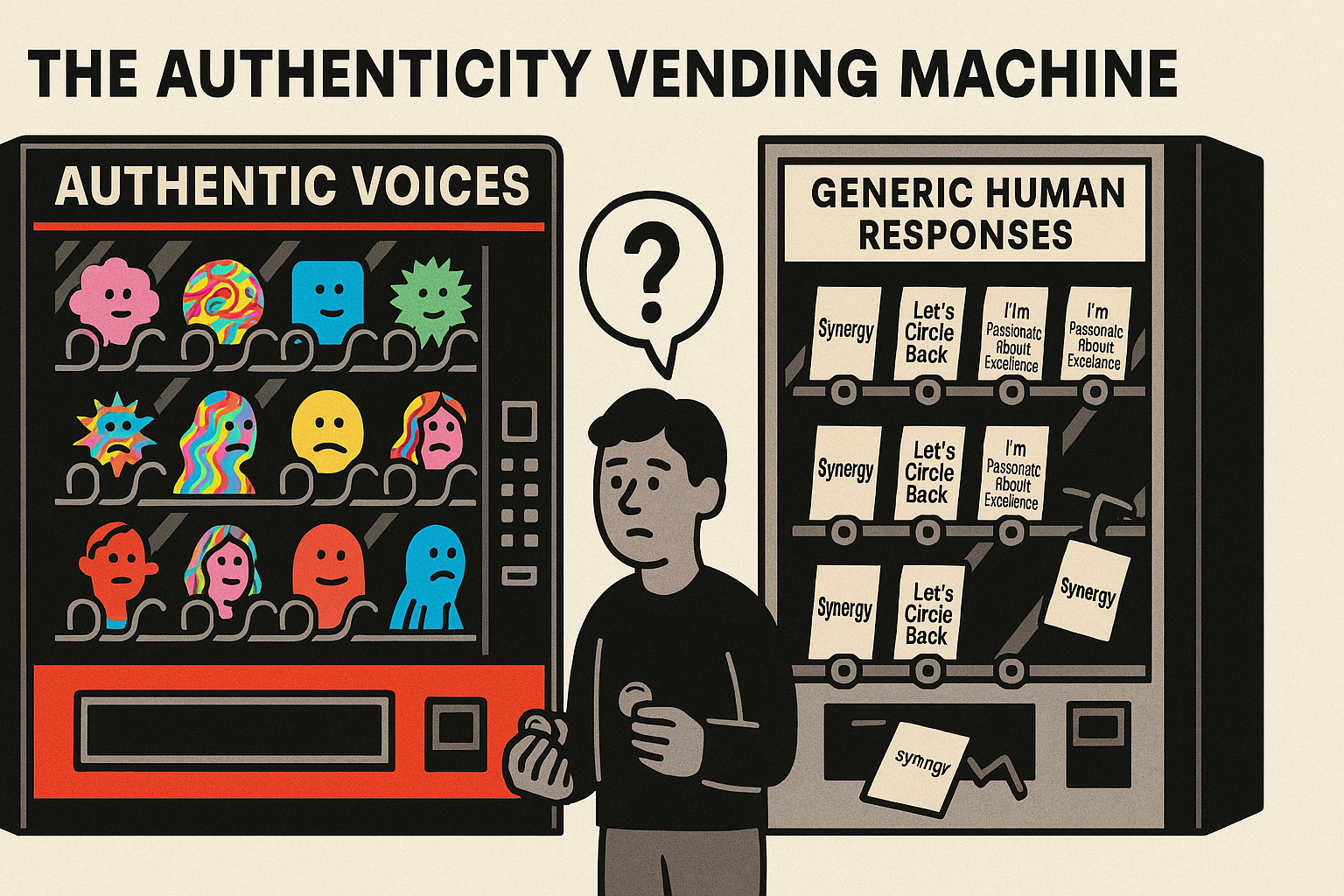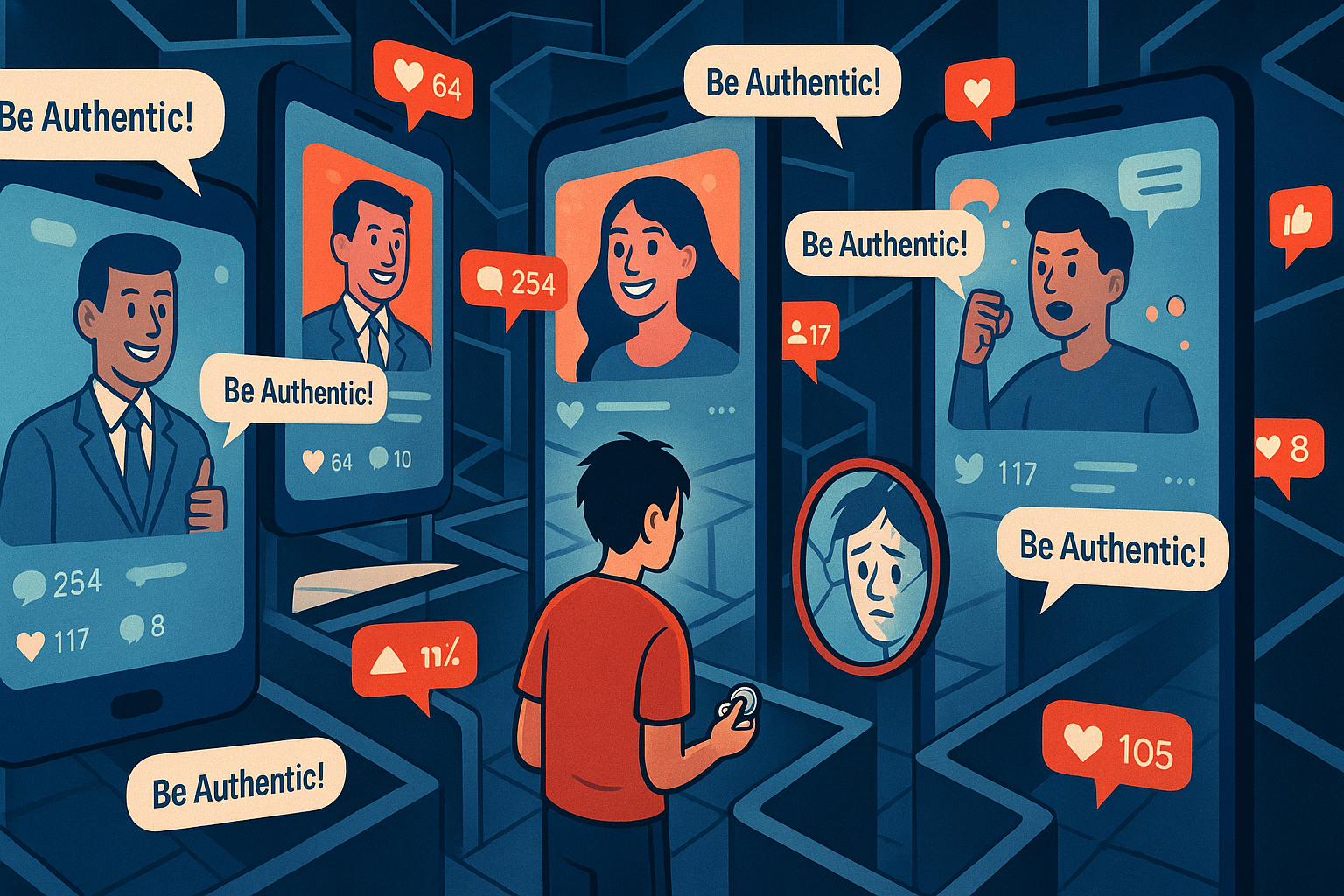Let's talk about finding your voice—and no, I don't mean that thing you lost after screaming at your TV during the last election cycle. I mean that deep, authentic, uniquely-you voice that most people have buried so far under layers of people-pleasing bullshit and social media personas that it might as well be Jimmy Hoffa.
Here's the uncomfortable truth: most people are walking around like human NPCs, spouting pre-programmed responses and living lives that would make a ChatGPT bot feel genuinely sorry for them. They've spent so much time trying to be what everyone else wants that they've become the human equivalent of vanilla ice cream—technically a flavour, but nobody's first choice.
The Great Identity Shopping Spree
Remember high school? That beautiful disaster where everyone tried on identities like they were shopping at Hot Topic during a clearance sale? One week you're goth, the next you're channelling your inner sk8er boi, then suddenly you're deep into the whole preppy thing because Madison from chemistry class said your Doc Martens were "like, so last year."
Here's the plot twist nobody tells you: that wasn't failure—that was research. Every cringeworthy phase, every mortifying attempt to be someone else, every moment you looked in the mirror and thought "who the hell is this person?" was just you conducting the most important experiment of your life. You were A/B testing your soul.
The problem is, somewhere along the way, society convinced us that this experimentation phase was supposed to end. That we should "grow up" and "be professional" and stop trying on different versions of ourselves, like we're playing dress-up in our mother's closet. So we picked a safe identity, usually around age 22, and decided to ride that horse into the sunset, even if it turned out to be a donkey with commitment issues.

The Authenticity Industrial Complex
Now we're living in the age of the "authenticity industrial complex," where everyone's telling you to "be yourself" while simultaneously providing you with a 47-point checklist of how to do it properly. Instagram influencers are hawking courses on "finding your authentic voice" while speaking in the same valley girl cadence and using identical caption formulas. It's like attending a seminar on individuality where everyone's wearing the same uniform.
The self-help section of any bookstore looks like a support group for people who've lost their personalities in a tragic LinkedIn accident. "7 Steps to Authentic Living!" "Unlock Your True Self!" "Be You, But Like, The Profitable Version!" These books are written by people who've turned authenticity into a brand, which is roughly equivalent to McDonald's lecturing you about artisanal cuisine.
The Real Cost of Being Fake
Here's what nobody wants to admit: living inauthentically doesn't just make you boring—it makes you fundamentally unemployable as a human being. When you spend your entire existence performing a character instead of being a person, you become as compelling as a Netflix show that got cancelled after two episodes for being "aggressively mediocre."
You know that person at work who agrees with everything, never has an original thought, and seems to have downloaded their personality from a corporate training manual? That's what happens when you murder your authentic voice and replace it with a customer service bot. They're not evil—they're just gone. They've committed personality suicide, and nobody bothered to call the cops.
And the networking events. Jesus, the networking events. Rooms full of people performing "professional authenticity" like they're auditioning for a role in "Generic Business Person: The Musical." Everyone's got their elevator pitch memorized, their LinkedIn buzzwords ready, and their authentic personality locked in the trunk of their car because it might say something inappropriate.
The Comedy Connection
This is why comedians are so fascinating to watch—they've figured out that authenticity isn't just about being "real," it's about being specifically, unapologetically themselves. Take someone like Mitch Hedberg, who decided that his voice was going to be delivered in the cadence of a philosophical stoner who just discovered wordplay. Or Dave Attell, who chose to sound like your funniest friend if your funniest friend was a caffeinated insomniac with commitment issues.
Neither of them tried to be the other. If Hedberg had attempted Attell's rapid-fire, aggressive style, it would've been like watching someone try to perform heavy metal on a ukulele—technically possible, but spiritually devastating. They found their frequencies and cranked them to eleven.
The Millennial Experiment
Let's pause and acknowledge the generational mind-fuck we're dealing with here. Millennials were told they could be anything they wanted, then handed an economy that suggested they might want to consider being something more practical, like "underemployed" or "living with roommates until they're 35."
Gen Z watched this disaster unfold and decided to skip the part where they pretend to have their shit together. They're out here being authentically confused and making bank on TikTok by filming themselves having existential crises in their childhood bedrooms. It's like they looked at the millennial playbook and said, "What if we just... didn't lie about being a mess?"
Meanwhile, Gen X is sitting in the corner, smoking metaphorical cigarettes and muttering, "We told you this would happen," like the prophets of workplace dysfunction we always were.
The Terror of Being Seen
The real reason most people don't find their voice is that having an authentic voice means people might disagree with you. And disagreement, in our current cultural moment, feels like violence. We've created a world where having an opinion is treated like committing a war crime, so everyone's walking around speaking in the verbal equivalent of beige paint.
People are so terrified of being "cancelled" or "problematic" that they've pre-cancelled themselves. They've become their own worst censors, editing their thoughts in real-time until what comes out sounds like it was written by a committee of HR representatives who've never experienced a human emotion.
But here's the thing about being genuinely yourself: some people won't like you. This isn't a bug—it's a feature. If everyone likes you, you're either Jesus Christ or you're so bland that you've achieved a kind of social invisibility that would make the CIA jealous.
The Workplace Theatre
Let's discuss "workplace authenticity," which is akin to "military intelligence" or "jumbo shrimp"—a contradiction so beautiful it deserves its own museum exhibit. Companies love to speak about wanting "authentic" employees, right up until someone's authenticity includes the opinion that mandatory team-building exercises are psychological warfare disguised as fun.
The modern workplace is a theatre where everyone's performing "Professional Human" while their true personalities are locked in their cars, listening to true crime podcasts and wondering why they went to university to become people who pretend to be excited about quarterly projections.
You've got people who are naturally funny pretending to be serious, naturally serious people pretending to be collaborative, and naturally collaborative people pretending they don't want to strangle their coworkers during the third "circle back" meeting of the week.
The Recovery Process
So, how do you excavate your authentic voice from beneath decades of people-pleasing sediment? First, acknowledge this is going to be messier than a toddler eating spaghetti. You're going to try on voices that don't fit, say things that make people uncomfortable, and occasionally sound like you're having an identity crisis in public, and that's because you are.
Pay attention to the moments when you feel most like yourself. Is it when you're ranting about something you honestly care about? When you're making your friends laugh? When you're alone in your car, singing off-key to songs that were popular when you thought frosted tips were the height of sophistication?
Notice the difference between the person you are when you're comfortable and the person you become when you're performing. The gap between those two individuals? That's where you've buried your voice.

The Couch Experiment Theory
Think of it like this: your authentic voice is like that perfect couch you've been looking for. You can't just walk into a furniture store and immediately know which one is "you." You have to sit on a bunch of different couches—some too soft, some too firm, some that looked great in the showroom but feel completely wrong in your living room.
The people who find their voice early are like those lucky bastards who walk into IKEA and immediately find the perfect coffee table. The rest of us have to go through what I call the "couch experiment phase", we're trying out different versions of ourselves until we find the one that feels like home.
And yes, this process might involve some questionable choices. You might go through a phase where you think your voice is "brutally honest" but you're kind of just being an asshole. You might try being "mysterious" and end up seeming like you're planning something illegal. This is normal. This is data.
The Social Media Minefield
Social media has turned voice-finding into a spectator sport, which is like trying to learn to drive while everyone in the world is backseat driving from their phones. People are performing authenticity for an audience of strangers who are also performing authenticity, creating a kind of meta-performance that would make Kafka weep with appreciation.
The algorithm rewards consistency, so people lock themselves into a "brand" and then spend years trapped inside it, like they've built themselves a personality prison and thrown away the key. You see it happening in real-time: someone finds a voice that gets engagement, then becomes a prisoner of that voice until they're posting the same content over and over but in slightly different fonts, like a human remix of themselves.
The Liberation
Here's the beautiful, terrifying truth: once you find your actual voice, you can't go back to performing someone else's. It's like learning to see in colour after living in black and white—the old way becomes physically uncomfortable. You start noticing how exhausting it is to be around people who are still performing, how empty most conversations are, how much energy everyone's wasting on elaborate social theatre.
But you also start connecting with people in ways that feel real, not networking but genuinely connecting. You're not building your personal brand, but becoming a person worth knowing. You stop trying to be interesting and start being interested. You stop managing your image and start living your life.
The Final Act
Finding your voice isn't about achieving perfection—it's about becoming specific. It's about progressing from the generic to the particular, from the borrowed to the owned, from the performed to the lived. It's about embracing the idea that you might be weird, and that being weird is infinitely more valuable than whatever the hell "normal" is supposed to be.
The world doesn't need another person trying to sound like everyone else. It needs whatever strange, specific, gloriously imperfect voice is hiding inside you, waiting for permission to come out and play.
So, stop auditioning for the role of yourself. Stop trying to be the person you think others want you to be. Start being the person you truly are, flaws, contradictions, questionable taste in music and all.
Because at the end of the day, authentic voices are like authentic people: rare, valuable, and impossible to fake. And in a world full of human NPCs reciting their programmed responses, being genuinely yourself isn't just refreshing—it's revolutionary.
Now, if you'll excuse me, I need to practice what I preach by having an authentic moment of existential dread about whether this article is too long, too cynical, or too likely to be misunderstood by people who think authenticity is something you can buy on Amazon Prime.
See? That's a voice. Anxious, overthinking, and mildly paranoid—but mine.


